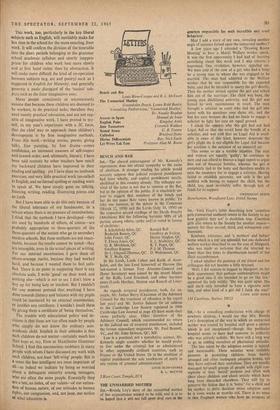Bench and Bar Louis Blom-Cooper and R. L. McEwen The
Unmarried Mother Gwendolen Desch, Lynne Reid Banks, 'Consulting Paediatrician; 'Unmarried Mother,' Dr. Natalie Bogdan Arrests in Spain Manuel de Irujo
English Pubs Kingsley Amis lain Tomorrow Creswick Wallace
Sound Sense G. B. Timms Culloden Winifred Duke Divine Differentials Rev. Nick Earle Let Wives Tak Tent Professor Alan M. Boase BENCH AND BAR
SIR,—The absurd extravagance of Mr. Kennedy's expressions does not attract sympathy to the cause of abolition. A stranger reading his article would scarcely suppose that judicial corporal punishment had been wholly, and capital punishment nearly, abolished in this country already. The unhappy sur- vival of the latter is not due to opinion at the Bar, but to the opinion of the public. It is absolutely un- true to suggest that members of the bench and bar do not make their views known in public. To take one instance, in the debate in the Commons (March 12, 1956) and the Lords (July 10, 1956) on the respective second readings of the Death Penalty (Abolition) Bill the following barrister MPs of all parties, among others, spoke andlor voted in favour of abolition:
S. Scholefield Allen, QC Ronald Bell Roderick Bowen, QC Geoffrey de Freitas John Foster, QC Hector Hughes, QC F. Elwyn Jones, QC E. L. Mallalieu, QC G. R. !Aitchison, QC R. T. Paget, QC Geoffrey Rippon P. J. M. Thomas Sir L. Ungoed-Thomas, QC D. Weitzmann, QC W. T. Wells, QC In the Lords, Lords Cohen and Keith of Avon- holm, and the late Lord Somervell of Harrow (the last-named a former Tory Attorney-General and Home Secretary) were joined by the recent Master of the Rolls, Lord Evershcd, and other barrister peers (Lords Merthyr, Meston and Russell of Liver- pool).
As regards corporal punishment, both, for ex- ample, Mr. Justice Barry (Chairman of the Advisory Council for the treatment of offenders in his report last year) and Mr. Justice Salmon (in an address to the Cambridge Law Society reprinted in 1960 Cambridge Law Journal at page 45) have made their views perfectly clear. Other members of the Advisory Council, which recommended no return to the judicial use of corporal punishment, included the former stipendiary magistrate, Mr. Paul Bennett, VC, and Mr. John Hobson, QC, MP.
Law is a practical, not a speculative, science; Mr. Kennedy might consider whether he would prefer to live under the criminal law as administered in other supposedly civilised countries, such as France or the United States. Or is the abolition of capital punishment the sole touchstone of merit in any system of criminal administration?










































 Previous page
Previous page